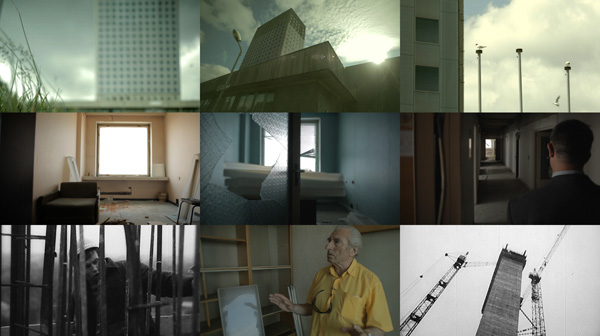22 Dec 2018
Events
Katrīna Neiburga: The Press House
The main role in Katrīna Neiburga’s new documentary-video installation is played by a publishing house that was once run by the Communist Party. It was built in Riga in 1978, the year the artist was born. The building is one of Riga’s few high-rise blocks from the Soviet period: a press building where the production of all newspapers and magazines was centralized. The empty building is now becoming a ruin, in both the physical and the historical sense.
Poet and former Press House worker Inese Zandere writes that Neiburga’s new work “manages to confer on the Press House the philosophical status of a ‘ruin’: an awareness of perishability; a historical scale; human particularity; and the right to sorrow and to a story of its own”.
Neiburga has created her work in the Cable Factory’s studio, as part of HIAP’s Paths Crossing production residency project for new and applicant EU Member States, in collaboration with the Latvian Centre for Contemporary Art. Neiburga is one of Latvia’s leading contemporary artists, and her works were previously seen in Finland in the 2008 Ars Fennica exhibition. The Press House is at the Cable Gallery 26.4–20.5.2012.
Zandere says that the stories that Neiburga has recorded “reveal the life of the Soviet Latvian press in its informal dimensions and expressive detail, replacing clichéd ideas of ‘how the whole thing worked’ with juicy documentary evidence. On the other hand, they make it possible for even the Soviet organs of censorship and security to be referred to in a personal and inclusive manner, with a warm smile”.
“It was only twenty years ago that the Press House, all twenty floors of it, was a field of active political battle and a weapon in our fight for freedom: inside its myriad tiny chambers, alongside its loyal guard, the grey Soviet concrete had hatched flocks seeking to overthrow its power. The subsequent destiny of the high-rise block and the print shop building saw them become a vivid symbol of the decade of savage capitalism, the privatisation years, the exploration of European markets, the restructuring of the local market, and, finally, the economic crisis,” the poet continues.
In Neiburga’s work the Press House is both a pathetic flunky and a national hero, it flirts with history and admits its own guilt, it glorifies and condemns itself, simultaneously portraying itself ironically and mythologizing itself.
Paths Crossing has been funded with the support of the Culture Programme of the European Union.

